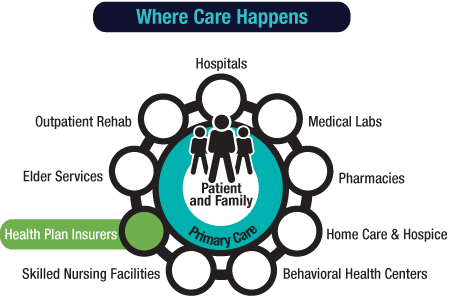
Health Plan Insurers and Care Coordination
The healthcare landscape has experienced major transformation in recent years—shifting how care is delivered, financed, and experienced by patients. One of the most significant changes has been the evolving relationship between individuals and health plan insurers, particularly in response to healthcare reform and new models of care.
Healthcare Reform in Massachusetts: A National Model
In 2006, Massachusetts enacted a landmark health care reform law requiring all residents to obtain health insurance or face a tax penalty. This initiative dramatically expanded coverage, and today, over 98% of Massachusetts residents have health insurance—one of the highest coverage rates in the country.
The reform also introduced Senior Care Options (SCOs)—a unique type of health plan specifically designed for low-income elders eligible for both Medicare and Medicaid. These plans integrate medical care and social support services, promoting a more holistic, person-centered approach to aging.
A New Approach to Care Delivery
Health plan insurers—both public and private—are adopting new care models aimed at improving outcomes while lowering costs. This shift is being led by the emergence of Accountable Care Organizations (ACOs) and integrated care teams, which coordinate services across a patient’s healthcare journey.
These new models emphasize:
- Preventative care over reactive treatment
- Primary care as the foundation of health and wellness
- Care coordination among providers, specialists, and social services
- Health equity and access for underserved populations
By proactively managing chronic conditions and addressing social determinants of health, insurers and healthcare systems alike are seeking to improve quality of life and reduce unnecessary hospitalizations.
Career Opportunities with Health Plan Insurers
As care models evolve, health plan insurers have expanded their workforce to include a diverse array of professionals who coordinate, manage, and support care delivery across various populations. These roles often involve interdisciplinary collaboration and patient-centered care planning.
Roles in Integrated Care Teams:
Organizations like Senior Care Options and similar care plans employ professionals who work in teams to support elderly and vulnerable populations. These interdisciplinary teams often include:
- Nurse Practitioners (NPs) – Provide primary care and serve as clinical leads within care teams.
- Registered Nurses (RNs) – Act as care coordinators, monitoring patient health, managing care plans, and supporting transitions of care.
- Licensed Practical Nurses (LPNs) – Support medication management, monitoring, and communication with patients and providers.
- Community Health Workers – Build relationships with patients to help them navigate healthcare systems and connect with local resources.
- Medical Assistants – Assist with basic clinical tasks and patient communication.
- Care Coordinators – Ensure timely delivery of care services and support patient access to benefits and providers.
Roles in Traditional Health Insurance Companies
Larger insurance companies—such as Blue Cross Blue Shield, UnitedHealthcare, and Tufts Health Plan—offer a variety of career opportunities that blend clinical expertise with administrative functions:
Case Managers (RNs)
Use clinical knowledge to help patients access appropriate care while managing cost and quality. Case managers often obtain specialized certification in case management or care coordination.
Social Workers
Serve as case managers or care planners, especially for patients with behavioral health conditions. Social workers ensure patients receive comprehensive care and are often involved in discharge planning, counseling, and connecting patients to community supports.
Pharmacy Services
Many insurers now offer mail-order pharmacy programs and clinical pharmacy services, creating opportunities for:
- Pharmacists – Oversee medication safety, counseling, and formulary management.
- Pharmacy Technicians – Support order fulfillment, processing, and patient communications.
- Operations and IT Specialists – Manage the logistics and systems that support high-volume, technology-driven pharmacy services (including emerging employers such as Amazon Pharmacy and PillPack).
A Growing and Evolving Field
Careers with health plan insurers offer a unique blend of clinical practice, public health, and systems-level impact. Professionals in this space work across the care continuum to improve outcomes, reduce health disparities, and help patients navigate increasingly complex healthcare environments.
Whether you are drawn to direct patient interaction, care coordination, or healthcare operations, this sector offers a range of opportunities to make a meaningful impact in a fast-changing field.
 Healthcare Workforce Partnership
Healthcare Workforce Partnership  REB - REGIONAL EMPLOYMENT BOARD OF HAMPDEN COUNTRY, INC.
REB - REGIONAL EMPLOYMENT BOARD OF HAMPDEN COUNTRY, INC.